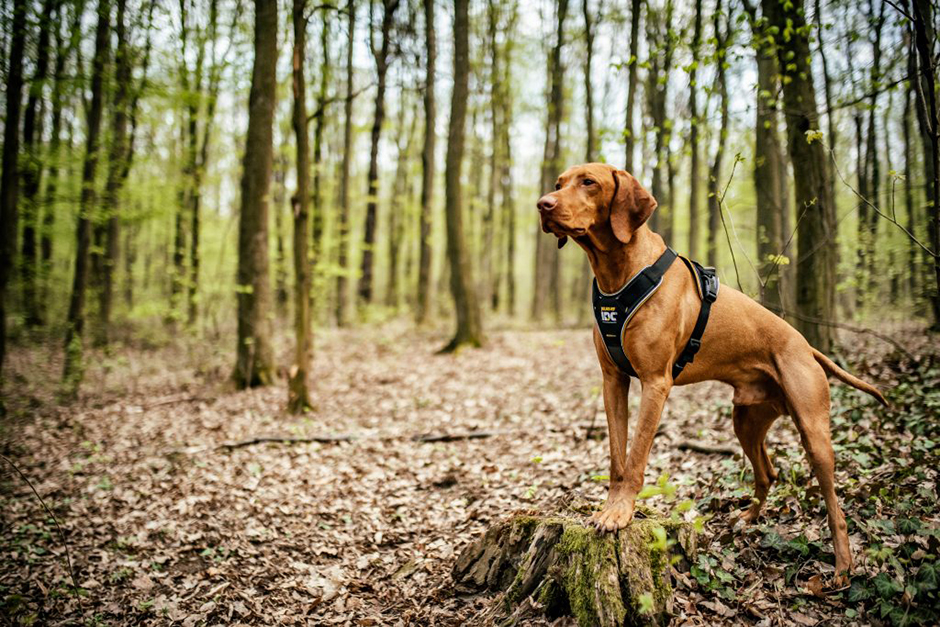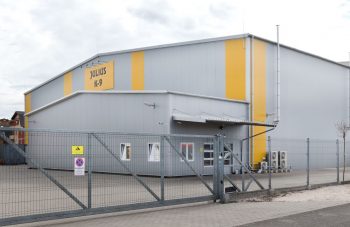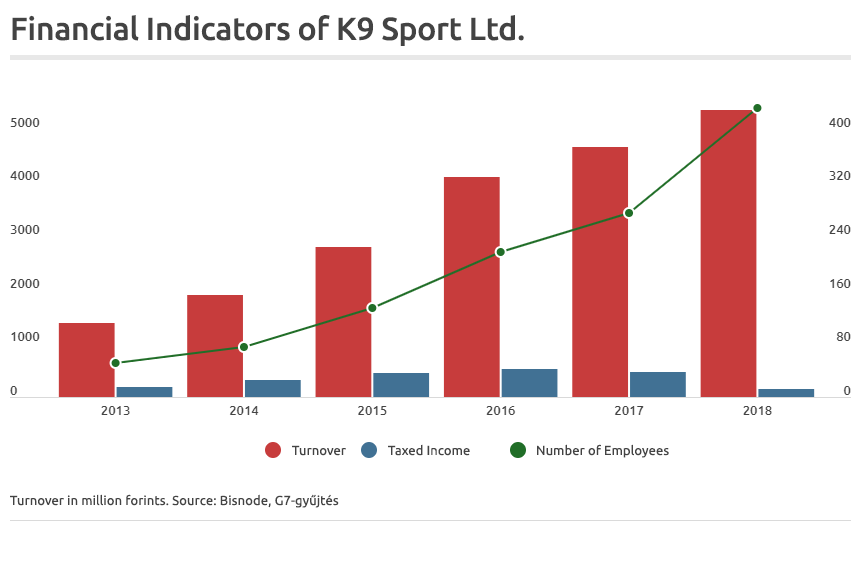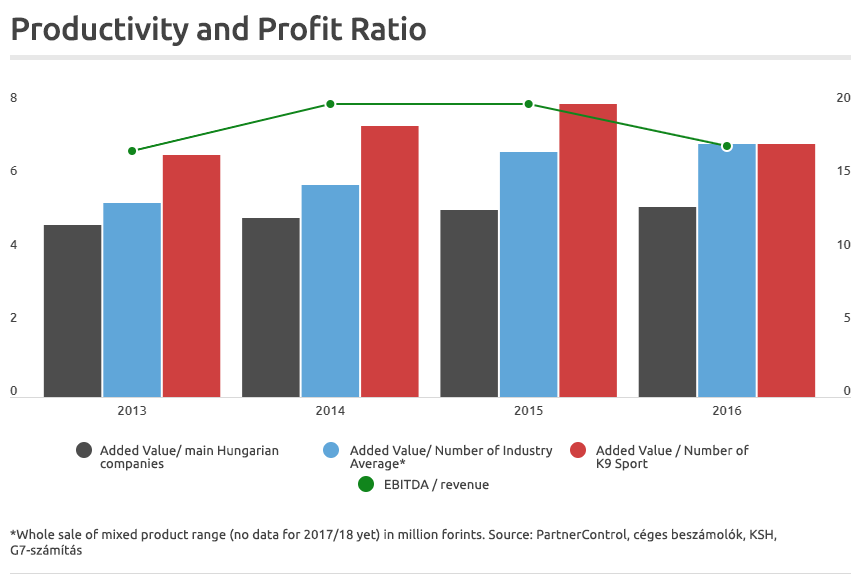Writer: Zoltán Jandó
A little over 20 years ago, a Hungarian couple discovered that it was almost impossible to find a high-quality dog harness, not only in Hungary, but in the entire world. They decided to design and manufacture their own dog harness, which they then transported to Austria in their car, having to deal with all the hassle of border control. Much has changed in the interim: Julius-K9®’s harness has since become such a global standard that even the biggest manufacturers in the world are copying the Hungarian design.
The history of Julius-K9® began in a small unheated garage in Szigetszentmiklós, a small city south of Budapest. With lots of experience in dog training, Julius Sebő and his ex-wife Anikó Bakos realised that there could be a great deal of demand for such equipment – especially within the professional community – yet nobody was producing it. Utilising his own professional experience, Julius Sebő designed a harness at home, in the previously mentioned garage, made from leather and leatherette.
A hundred mile an hour wind on no man’s land
At that time, it seemed as if Hungary wasn’t interested enough in high quality (therefore more expensive) equipment, and the relevant dog-related organisations appeared to be happy with cheap gear as long as it complied with relevant regulations. This made it obvious to the early Julius-K9® team that their products would need to be sold abroad. They reached out to retailers on a one-to-one personal basis, as well as showing off their products at exhibitions and also searching for buyers on the internet. Their first big partner from across the border was the leading sales outlet of the Austrian German Shepherd Association, the same school where Julius Sebő had worked as a trainer. Thanks to this relationship, the news of the Hungarian harnesses reached hundreds of Austrian dog schools, followed by examples of the product itself.

The process of getting the harnesses to these new customers was not as easy as you might think. Hungary was not yet a member of the EU in the late 90’s, meaning that border control was very strict, and at that time the young couple did not have the capital to finance a transportation service.
“We may have been the very first individuals to transport such light industry products and to take them through customs all by ourselves. We went as far as Hegyeshalom every week, got our stamps on the Hungarian side, then walked across to Austria through the so-called “no man’s land” – a barren place with a constant 100 km/h wind. In the meantime, we were checked by armed guards, and only then could we get to the Austrian buildings. The only things that mattered to us were to not get stuck between the trucks and to be able to load our car with as much cargo as possible.
“To be honest, we sometimes overdid it. With dog mattresses stacked up to more than a metre high on top of the car, we looked more like flea market vendors than professional traders.” – recalls Sebő Julius about the events that took place over two decades ago.
Although harnesses were already at the main focus of their attention at the time, the story of the dog mattresses is a good example of how they tried to please their buyers’ needs in many different ways. Some of these early products eventually got lost along the way, however the development of their dog harnesses continued. As the number of orders began to grow significantly, it became increasingly important to speed up the manufacturing process, perhaps by including elements of automation. Unfortunately, leather and imitation leather were not fit for the job, especially since the entire industry that produced these products was disappearing from Europe at the time. It was because of this that they began to work with textiles and they started to use carefully chosen manufacturers to help them. The harnesses were no longer made by hand in a small shed.
The stolen car that kick started the business
The search for further alternative sales opportunities continued. Julius Sebő even said himself: “We tried to squeeze ourselves into every possible place we could with our products.” At the beginning of the new millennium, they met a commercial trader who promised to put them in contact with the Austrian police, who were in need of muzzles for their working dogs.
“We received some police product samples from our Austrian seller, but they were stolen together with Julius’s car during the night in Újpest. The seller was furious about the lost samples, so we decided to go to the Austrian dog centre ourselves, and to personally take responsibility for the incident” – says Anikó Bakos.
At the Austrian police centre, the staff barely understood what Julius and Anikó were talking about when they apologised for the stolen products. They told them that those samples had been scrapped products, not even worth worrying about. But since Julius and Anikó were there, the people at the centre began to ask questions about their business. The conversation concluded in a deal, and so from then on, they were able transport their products directly to their new customers.
This Austrian police connection went on to open so many new doors.
At the time, the police had connections to the army and various rescue dog organisations, therefore Julius-K9® harnesses were soon making their way to all the important dog-related bodies in the country. From this point on, it did not take long before the products were on their way to both Germany and Afghanistan.
From Bug to Porsche
The Julius-K9® range of products were primarily known in the “working dog” sector in those early days. This all changed in 2003 when the brand made a very successful impression at the world dog show in Dortmund, Germany. “This was the moment we realised that we were good at what we do, and that we could make a living out of it” – said Julius Sebő. The company began to grow dynamically from this point on.
At the time of the Dortmund dog show, the company’s turnover barely scratched 20 million forints (€60000) a year. By 2008, this had increased to over 20 times that amount (to more than €1.2 million) and the company had begun to make a decent profit.
At this point, the company could finally make previously postponed investments, which allowed them to build their own factory. They have opened several other manufacturing units since then, however in order to maintain flexibility, they have kept and developed their outsourcing network too.
The same flexible approach has also been applied to the company’s sales strategy. Since it has been the main goal from the very beginning to sell as many products as possible, Julius-K9® built a wholesale affiliate network in the early days, and this is still operating successfully.
At the same time, the business has continued to do very well in the area of product development. Not only is the 20-year-old brand still successful but the company has also diversified, releasing new models in 2010 called the “IDC” family. These new products are also selling well and have won international and Hungarian design prizes.
“If I wanted to explain the changes our harness designs went through with a metaphor, I would say we set off with a Volkswagen Beetle 10 years ago and ended up with a Porsche.” – explained Julius.
Growth over everything
The “Porsche” did so well that we produced 160 thousand of them last year. The fast pace of growth used up almost the entire capacity of the company. Although Julius-K9® did experiment with innovation, the newer ideas did not make it into reality for a while, since dealing with the orders for the older models left the new, and innovative ideas waiting on the back burner.

Following Julius-K9®’s success, other companies in competition began to invest in the development and marketing of neck harnesses. Although Julius-K9® had similar ideas, this competition developed a lead in this area.
Last year’s financial peak was followed by a slight decline. Instead of letting this hold them back Julius-K9® decided to turn the situation to their advantage, investing all their energy into product development and improved efficiency. Learning from their mistakes, the company recently released a neck harness, that would, they hoped, revolutionize the market in the same way as their first products had done. And the signs are looking good for them to do just this, as the product succeeded in winning the international Red dot design award.
Furthermore, the product is being studied by British and American scientific community, with its beneficial features being the focus of a number of articles.
As counterfeit products have already been an issue with previous harness models, copyright for the innovation of the IDC family and new neck harness has received maximum attention this time around. The company also aims to help its reselling partners fight fake products. It oversees the legal inspection of over 40 platforms directly from Hungary and in alliance with international investigative authorities.
Through this anti-fake product work, Julius-K9® came into contact with big online markets such as Amazon and the Chinese company, Alibaba. Following initial communications, Julius-K9® discovered huge potential in the online sales of their own genuine products, leading to 30% of today’s sales being made through these online platforms. This percentage is expected to grow in the future, with the help of the company’s online selling group.
Demand for the brand
The group is doing better from a business perspective too. Due to organisational changes, activities have now been brought together as K9 Sport Ltd. The company’s revenue has been continuously growing in the last couple of years, reaching a turnover of over 5 billion forints last year. The company continues to produce good results, and even though figures have slightly decreased in the last couple of years, they are still above Hungarian and international averages.

The number of employees has also seen significant growth recently. The company that started off with two people employed 50 people in 2013 and currently has over 400 staff. The owners of the company do not measure success with financial figures alone. They consider their greatest achievements to be their indispensable situational awareness and adaptability, especially in the current economic situation, along with the potential of their new products and the developer team behind them.

In addition, the brand is strongly growing in popularity. So much in fact, that other companies have successfully arranged deals with K9 Sport Ltd for the use of the name for different products. This has led to the production of several different accessories and animal food products being sold under our brand. These are all manufactured by partner companies, who are very careful to deliver the quality worthy of the brand.
Source: G7